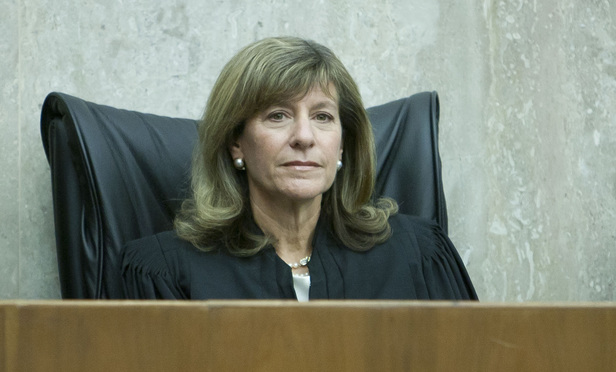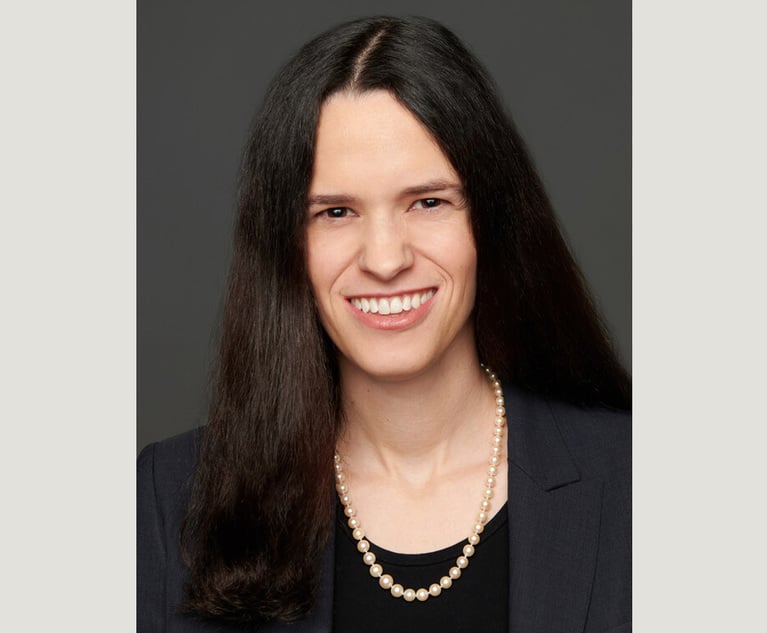Manafort Judge Says Foreign Lobbying Law Is No 'Pesky Regulation'
U.S. District Judge Amy Berman Jackson used forceful language to recognize FARA's newly elevated status while sentencing Paul Manafort.
March 13, 2019 at 08:01 PM
6 minute read
 U.S. District Judge Amy Berman Jackson. Photo by Diego M. Radzinschi/ALM
U.S. District Judge Amy Berman Jackson. Photo by Diego M. Radzinschi/ALM
On the day Paul Manafort was indicted in 2017, his defense lawyer Kevin Downing stepped out of the courthouse in Washington and declared the case “ridiculous.”
Downing said the special counsel's office was advancing a “very novel theory” to charge Manafort with failing to disclose his past lobbying work for Ukraine. Since the mid-1960s, Downing said, the U.S. government had pursued only a half dozen criminal cases under the law he called “FARA”—the Foreign Agents Registration Act.
For many, Manafort's case served as an introduction to a previously obscure law requiring the disclosure of foreign influence campaigns in the United States. It also put the influence industry on notice, sending a flood of new registrations—some retroactive—into a Justice Department that is enforcing FARA with new vigor.
On Wednesday, U.S. District Judge Amy Berman Jackson of the District of Columbia used forceful language to recognize FARA's newly elevated status, saying the disclosure law was not merely a “pesky regulation” as she sentenced Manafort.
Jackson underscored the government's interest in bringing lobbying for foreign governments to light. And she dismissed the notion that Manafort's admitted violation of the law amounted to just a procedural slipup. Her sentence, coming days after a separate sentencing in a financial fraud case in Virginia, elevated Manafort's prison term to seven-and-a-half years.
By failing to register his work for former Ukrainian President Viktor Yanukovych, Manafort “was hiding the truth” of who he represented, Jackson said. She also said it was “antithetical to the very American values” Manafort had said he championed.
“When people don't have the facts, democracy can't work,” she said, adding that Manafort had effectively lied to Congress and the American public by failing to properly disclose his work for Ukraine.
Jackson said Manafort was “not a spy” but a lobbyist. And lobbying is not illegal—even when arrangements with foreign countries involve representing “odious” or “tyrannical” regimes and figures, she said. But it was Manafort's failure to disclose his lucrative Ukraine work that was landing him in prison.
But by failing to disclose his lobbying, Jackson said Manafort “was lying to members of Congress and the American public.”
Complaints Over Prosecution
Downing reiterated his view Wednesday that the Justice Department had traditionally taken a light touch toward FARA, with a “communicative style” that prioritized bringing lobbyists into compliance with the law. But in the time Manafort has faced charges from the special counsel, the Justice Department has pivoted toward enforcement.
In January, Skadden, Arps, Slate, Meagher & Flom reached a civil settlement with the Justice Department resolving claims that it failed to register as a foreign agent in connection with its own past work for Ukraine.
The firm retroactively registered and paid more than $4.6 million to the U.S. government, representing the amount it received to conduct a purportedly independent analysis of the Ukrainian government's prosecution of Yulia Tymoshenko, a former prime minister and political rival of the country's Russia-aligned president at the time, Viktor Yanukovych.
Former Skadden partner and White House counsel Gregory Craig is facing questions about his unregistered foreign-lobbying work. His lawyer, William Taylor of Zuckerman Spaeder, has said Craig was not required to register under FARA.
The Justice Department's enforcement of foreign influence laws appears to be ratcheting up.
In recent remarks in New Orleans, Assistant Attorney General John Demers, the head of the Justice Department's national security division, said he was overhauling the FARA unit to more aggressively pursue undisclosed lobbying for foreign governments. Demers said he is naming Brandon Van Grack, a former special counsel prosecutor and a deputy chief in the national security division's counterespionage unit, as the new head of the FARA unit.
“It appears the department is also making other staffing changes within the FARA unit, presumably to reorient it toward enforcement,” lawyers at Covington & Burling wrote in a recent client alert about Demers' comments. “In his remarks, Demers appeared to emphasize the department's intention to pursue unregistered foreign agents.”
Van Grack was involved in some of the special counsel's highest-profile prosecutions, including the financial fraud case against Manafort in Virginia. On Wednesday, he appeared in court for Manafort's sentencing while special counsel prosecutor Andrew Weissmann argued the longtime political operative had no excuse for failing to register as a foreign agent.
Weissmann underlined the cost of Manafort's misconduct. FARA filings, he said, provided details such as “when, where, what and how much is being spent” on foreign influence efforts in the United States. Manafort, he said, avoided filing under FARA to maintain the appearance that foreign leaders enlisted for his lobbying campaign, among others, were acting independently when they were, in fact, “handsomely paid.”
The failure to file, Weissman said, deprived the American public and Manafort's lobbying targets the information they were entitled to under FARA. He described Manafort's conduct as “corrosive to faith in the political process.”
“Secrecy,” Weissmann said, “was integral to what Manafort wanted to do for Ukraine.”
Read more:
DC Judge Dismisses 'Plea for Leniency' While Imposing Manafort Sentence
Skadden's DOJ Deal Is Off-Limits for Russian Company Claiming Mueller Abuses
The Curious Case of Joe Lieberman's Work as a Lobbyist Who Isn't 'Advocating'
Registering as a 'Foreign Agent'? Why Law Firms and Lobby Shops Might Demur.
'Sleepless Nights' for D.C. Lobbyists Follow Manafort Indictment
This content has been archived. It is available through our partners, LexisNexis® and Bloomberg Law.
To view this content, please continue to their sites.
Not a Lexis Subscriber?
Subscribe Now
Not a Bloomberg Law Subscriber?
Subscribe Now
NOT FOR REPRINT
© 2025 ALM Global, LLC, All Rights Reserved. Request academic re-use from www.copyright.com. All other uses, submit a request to [email protected]. For more information visit Asset & Logo Licensing.
You Might Like
View All
In-House Moves of the Month: Boeing Loses Another Lawyer, HubSpot Legal Chief Out After 2 Years
5 minute read
After Regime Change, Syria Remains Liable in US Federal Courts for Alleged Assad-Era Terrorism Support
3 minute read

Split 4th Circuit Ruling Is a Win for Covington & Burling in US Army Base Attack Litigation
3 minute readTrending Stories
Who Got The Work
J. Brugh Lower of Gibbons has entered an appearance for industrial equipment supplier Devco Corporation in a pending trademark infringement lawsuit. The suit, accusing the defendant of selling knock-off Graco products, was filed Dec. 18 in New Jersey District Court by Rivkin Radler on behalf of Graco Inc. and Graco Minnesota. The case, assigned to U.S. District Judge Zahid N. Quraishi, is 3:24-cv-11294, Graco Inc. et al v. Devco Corporation.
Who Got The Work
Rebecca Maller-Stein and Kent A. Yalowitz of Arnold & Porter Kaye Scholer have entered their appearances for Hanaco Venture Capital and its executives, Lior Prosor and David Frankel, in a pending securities lawsuit. The action, filed on Dec. 24 in New York Southern District Court by Zell, Aron & Co. on behalf of Goldeneye Advisors, accuses the defendants of negligently and fraudulently managing the plaintiff's $1 million investment. The case, assigned to U.S. District Judge Vernon S. Broderick, is 1:24-cv-09918, Goldeneye Advisors, LLC v. Hanaco Venture Capital, Ltd. et al.
Who Got The Work
Attorneys from A&O Shearman has stepped in as defense counsel for Toronto-Dominion Bank and other defendants in a pending securities class action. The suit, filed Dec. 11 in New York Southern District Court by Bleichmar Fonti & Auld, accuses the defendants of concealing the bank's 'pervasive' deficiencies in regards to its compliance with the Bank Secrecy Act and the quality of its anti-money laundering controls. The case, assigned to U.S. District Judge Arun Subramanian, is 1:24-cv-09445, Gonzalez v. The Toronto-Dominion Bank et al.
Who Got The Work
Crown Castle International, a Pennsylvania company providing shared communications infrastructure, has turned to Luke D. Wolf of Gordon Rees Scully Mansukhani to fend off a pending breach-of-contract lawsuit. The court action, filed Nov. 25 in Michigan Eastern District Court by Hooper Hathaway PC on behalf of The Town Residences LLC, accuses Crown Castle of failing to transfer approximately $30,000 in utility payments from T-Mobile in breach of a roof-top lease and assignment agreement. The case, assigned to U.S. District Judge Susan K. Declercq, is 2:24-cv-13131, The Town Residences LLC v. T-Mobile US, Inc. et al.
Who Got The Work
Wilfred P. Coronato and Daniel M. Schwartz of McCarter & English have stepped in as defense counsel to Electrolux Home Products Inc. in a pending product liability lawsuit. The court action, filed Nov. 26 in New York Eastern District Court by Poulos Lopiccolo PC and Nagel Rice LLP on behalf of David Stern, alleges that the defendant's refrigerators’ drawers and shelving repeatedly break and fall apart within months after purchase. The case, assigned to U.S. District Judge Joan M. Azrack, is 2:24-cv-08204, Stern v. Electrolux Home Products, Inc.
Featured Firms
Law Offices of Gary Martin Hays & Associates, P.C.
(470) 294-1674
Law Offices of Mark E. Salomone
(857) 444-6468
Smith & Hassler
(713) 739-1250








